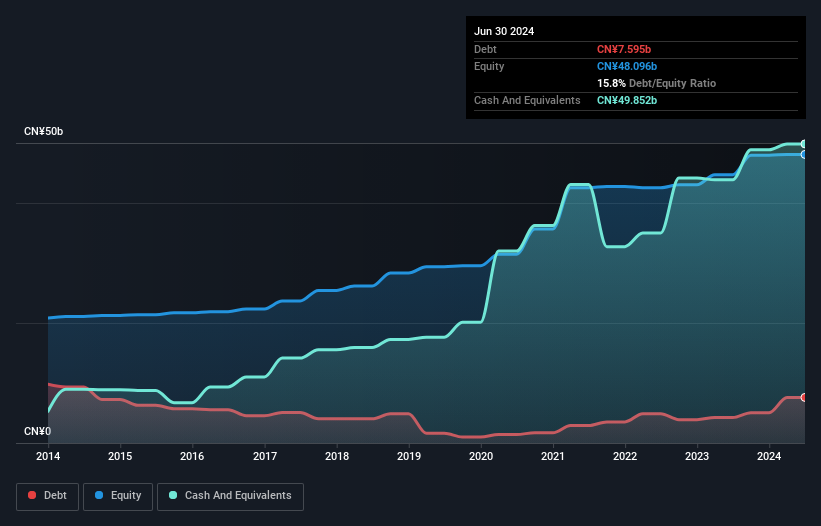Does Sinotruk (Hong Kong) (HKG:3808) Have A Healthy Balance Sheet?
Some say volatility, rather than debt, is the best way to think about risk as an investor, but Warren Buffett famously said that 'Volatility is far from synonymous with risk.' It's only natural to consider a company's balance sheet when you examine how risky it is, since debt is often involved when a business collapses. Importantly, Sinotruk (Hong Kong) Limited (HKG:3808) does carry debt. But the more important question is: how much risk is that debt creating?
Why Does Debt Bring Risk?
Debt and other liabilities become risky for a business when it cannot easily fulfill those obligations, either with free cash flow or by raising capital at an attractive price. Part and parcel of capitalism is the process of 'creative destruction' where failed businesses are mercilessly liquidated by their bankers. While that is not too common, we often do see indebted companies permanently diluting shareholders because lenders force them to raise capital at a distressed price. Having said that, the most common situation is where a company manages its debt reasonably well - and to its own advantage. When we examine debt levels, we first consider both cash and debt levels, together.
Check out our latest analysis for Sinotruk (Hong Kong)
What Is Sinotruk (Hong Kong)'s Debt?
You can click the graphic below for the historical numbers, but it shows that as of June 2024 Sinotruk (Hong Kong) had CN¥7.59b of debt, an increase on CN¥4.24b, over one year. But on the other hand it also has CN¥49.9b in cash, leading to a CN¥42.3b net cash position.

How Healthy Is Sinotruk (Hong Kong)'s Balance Sheet?
Zooming in on the latest balance sheet data, we can see that Sinotruk (Hong Kong) had liabilities of CN¥83.3b due within 12 months and liabilities of CN¥1.35b due beyond that. Offsetting these obligations, it had cash of CN¥49.9b as well as receivables valued at CN¥24.7b due within 12 months. So its liabilities outweigh the sum of its cash and (near-term) receivables by CN¥10.1b.
Of course, Sinotruk (Hong Kong) has a market capitalization of CN¥54.1b, so these liabilities are probably manageable. However, we do think it is worth keeping an eye on its balance sheet strength, as it may change over time. While it does have liabilities worth noting, Sinotruk (Hong Kong) also has more cash than debt, so we're pretty confident it can manage its debt safely.
Even more impressive was the fact that Sinotruk (Hong Kong) grew its EBIT by 111% over twelve months. If maintained that growth will make the debt even more manageable in the years ahead. The balance sheet is clearly the area to focus on when you are analysing debt. But it is future earnings, more than anything, that will determine Sinotruk (Hong Kong)'s ability to maintain a healthy balance sheet going forward. So if you're focused on the future you can check out this free report showing analyst profit forecasts.
Finally, a company can only pay off debt with cold hard cash, not accounting profits. While Sinotruk (Hong Kong) has net cash on its balance sheet, it's still worth taking a look at its ability to convert earnings before interest and tax (EBIT) to free cash flow, to help us understand how quickly it is building (or eroding) that cash balance. Over the last three years, Sinotruk (Hong Kong) actually produced more free cash flow than EBIT. That sort of strong cash conversion gets us as excited as the crowd when the beat drops at a Daft Punk concert.
Summing Up
While Sinotruk (Hong Kong) does have more liabilities than liquid assets, it also has net cash of CN¥42.3b. The cherry on top was that in converted 152% of that EBIT to free cash flow, bringing in CN¥12b. So we don't think Sinotruk (Hong Kong)'s use of debt is risky. When analysing debt levels, the balance sheet is the obvious place to start. However, not all investment risk resides within the balance sheet - far from it. We've identified 1 warning sign with Sinotruk (Hong Kong) , and understanding them should be part of your investment process.
When all is said and done, sometimes its easier to focus on companies that don't even need debt. Readers can access a list of growth stocks with zero net debt 100% free, right now.
Have feedback on this article? Concerned about the content? Get in touch with us directly. Alternatively, email editorial-team (at) simplywallst.com.
This article by Simply Wall St is general in nature. We provide commentary based on historical data and analyst forecasts only using an unbiased methodology and our articles are not intended to be financial advice. It does not constitute a recommendation to buy or sell any stock, and does not take account of your objectives, or your financial situation. We aim to bring you long-term focused analysis driven by fundamental data. Note that our analysis may not factor in the latest price-sensitive company announcements or qualitative material. Simply Wall St has no position in any stocks mentioned.
 Index Options
Index Options CME Group
CME Group Nasdaq
Nasdaq Cboe
Cboe TradingView
TradingView Wall Street Journal
Wall Street Journal